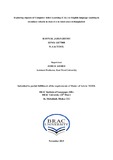Exploring impacts of computer aided learning (CAL) on english language teaching in secondary schools in class ix-x in rural areas in Bangladesh

View/
Date
2015-11Publisher
BRAC UniversityAuthor
Jhumu, Rawnak JahanMetadata
Show full item recordAbstract
The study attempts to explore impacts of CAL (Computer Aided Learning) on English language teaching in secondary schools in class ix & x in rural areas in Bangladesh. The main aim of this study is to find out how far Computer Aided Learning (CAL) materials (English) are effective for the learners, what the nature and challenges of CAL are, what the hindrances / constraints are to implement it. The research is primarily based upon one of the modern theories in teaching, ‘constructivism theory’, which focuses on learning by doing and learning through technology (Shafaei, 2012). Both qualitative and quantitative approaches are used in this study. The data is gathered from seventy (70) students, seven (7) English language teachers and from seven (7) CAL English class observations in rural areas in Bangladesh. All the numerical data are analyzed and processed through statistical software in computer (SPSS). For the qualitative data analysis another mechanism (manually or discourse analysis) is used to interpret them. The findings of the study offer insights to the government and non-government agencies, primary and secondary school authorities and other researchers to take into consideration the present condition and challenges of ICT based teaching and learning in rural areas of Bangladesh. It is expected that the findings will help the concerned authority to deal with the challenges.
